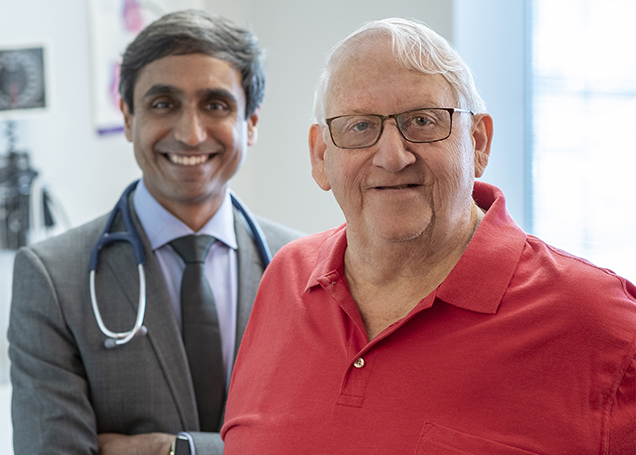(Pictured) Dr. Ravi Yarlagadda, Eletrophysiologist, and Ron Mersman.
“It is very comforting to know that I have less risk of having a stroke, and I don’t have to be on blood thinner medicine anymore.”
 Ron Mersman has been a woodworker all of his life. He builds cabinets, and his hobby is creating barn board picture frames. But one thing he couldn’t fix with his own hands was his heart. So he turned to the Cardiology Services team at Olathe Health.
Ron Mersman has been a woodworker all of his life. He builds cabinets, and his hobby is creating barn board picture frames. But one thing he couldn’t fix with his own hands was his heart. So he turned to the Cardiology Services team at Olathe Health.
About six years ago, Ron learned he had a heart rhythm disorder called atrial fibrillation (a-fib). It was causing his heart to beat at an irregular, rapid pace. It also made him tired.
Ron went to see Ravi Yarlagadda, MD, an electrophysiologist at Olathe Health who specializes in heart rhythm disorder treatment.
“Dr. Yarlagadda had to shock my heart back into rhythm three different times, so he put in a pacemaker, and that really helped,” Ron said. “I started feeling better as time went on. I could walk farther without getting tired. It made a big difference.”
A pacemaker is a small device that’s placed in the chest or abdomen to help control abnormal heart rhythms. This device uses electrical pulses to prompt the heart to beat at a normal rate.
Although Ron had more energy after the pacemaker was implanted, he struggled with side effects from taking blood thinner medication.
“Patients with atrial fibrillation need to be on medication that thins the blood because they are at an increased risk of stroke – five times that of the general population – because of blood clots that can form in the left atrial appendage of the heart,” Dr. Yarlagadda said. “Ron could not be on these medications anymore because of increased bleeding from his stomach.”
The medication was also causing unsightly blood spots on Ron’s arms.
“If you get a scrape, or bump your arm even slightly, you can get very ugly blood spots from the blood thinner medicine,” Ron said. “Dr. Yarlagadda said, ‘If we can get you off of blood thinners, then let’s do it.’ I said okay!”
Dr. Yarlagadda recommended Ron have a new, non-invasive cardiology procedure at Olathe Health for patients with a-fib called Left Atrial Appendage (LAA) Closure. During the procedure, Dr. Yarlagadda placed a small implant in the LAA of Ron’s heart to close off this part of the heart and prevent blood clots from escaping.
“There was no pain,” Ron said. “I had to stay in the hospital overnight, and I was released the next day. It was a very good experience.”
About six months after the procedure, Ron was able to stop taking blood thinner medication.
“It is very comforting to know that I have less risk of having a stroke, and I don’t have to be on blood thinner medicine anymore,” Ron said. “Once I got off the medicine, those big ugly blood spots on my arms went away.”
“Dr. Yarlagadda is a great doctor,” Ron said. “I have absolute, total faith in the man. He actually calls me at home every once in a while to see how I am doing. Doctors don’t normally do that. He really cares.”

